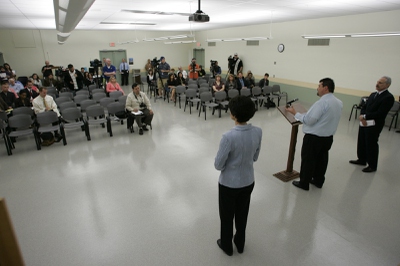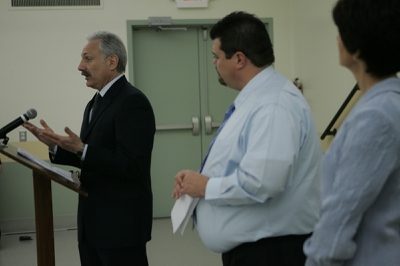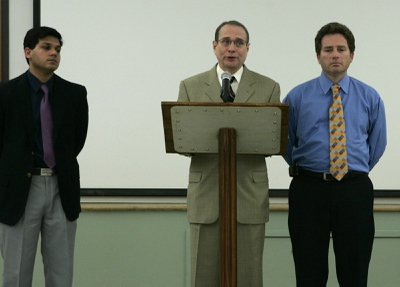Wednesday, Feb. 27, 2008 | 2:41 p.m.

Lisa Jones, left, bureau chief for the Nevada State Health Division's Bureau of Licensure and Certification, Brian Labus, center, Southern Nevada Health District (SNHD) senior epidemiologist, and Dr. Lawrence Sands, SNHD chief health officer, hold a news conference at the health district Wednesday, February 27, 2008. The health district is notifying about 40,000 former patients of the Endoscopy Center of Southern Nevada that they may have been exposed to hepatitis C.

Dr. Lawrence Sands, left, Southern Nevada Health District (SNHD) chief health officer, speaks as Brian Labus, center, SNHD senior epidemiologist, and Lisa Jones, bureau chief for the Nevada State Health Division's Bureau of Licensure and Certification, look on during a news conference at the health district Wednesday, February 27, 2008. The health district is notifying about 40,000 former patients of the Endoscopy Center of Southern Nevada that they may have been exposed to hepatitis C.

Endoscopy Center of Southern Nevada doctors Sanjay Nayyar, left, and Clifford Carrol flank fellow doctor Eladio Carrera as he reads a statement during a news conference at the health district Wednesday, February 27, 2008. The Southern Nevada Health District is notifying about 40,000 former patients of the Endoscopy Center of Southern Nevada that they may have been exposed to hepatitis C.
Southern Nevada Health District officials announced today they have identified six cases of hepatitis C, five of which stemmed from procedures occurring on the same day that involved anesthesia at the Endoscopy Center of Nevada.
Following a joint investigation with the Nevada State Bureau of Licensure and Certification (BLC) and with consultation from the Centers for Disease Control and Prevention, the health district determined that unsafe injection practices related to the administration of anesthesia medication might have exposed patients to the blood of other patients.
The health district is recommending 40,000 patients who had procedures requiring injected anesthesia at the clinic between March 2004 and January 11, 2008, contact their primary care physicians or health care providers to get tested for hepatitis C as well as hepatitis B and HIV.
Here is the district’s announcement.
And here is the company’s response:
On behalf of the Endoscopy Center of Southern Nevada, we want to express our deep concern about this incident to the many patients who have put their trust in us over the years. As always, our patients remain our primary responsibility and we have already corrected the situation.
The recent events related to the Southern Nevada Health District study mark the first time anything like this has ever happened at our facility. We have already taken steps to ensure that it will never happen again.
The health district began its investigation in January, and we have been fully cooperating with them. We were officially notified by the health district on February 6, 2008 and submitted our detailed Plan of Correction on February 15, 2008. All concerns noted by the health department were addressed immediately. We continue to work closely with the Southern Nevada Health District and other health agencies during this ongoing review. We want to be sure that every patient who may have been exposed is informed and tested.
To help us with these issues, we have engaged the services of nationally renowned experts who have extensive epidemiological experience and that have worked closely with the Centers for Disease Control in the past. They include Dr. Janine Jason, CEO of Jason and Jarvis Associates. She is a Harvard Medical School-trained physician, epidemiologist, and immunologist who served as a medical scientist and senior epidemiologist at the Centers for Disease Control and Prevention and was on the Emory Medical School faculty for 23 years prior to becoming a private consultant. Dr. Jason has authored more than a hundred peer-reviewed medical and epidemiologic scientific articles.
In addition to our corrective actions, we are on a mission to maintain the trust our patients have had in us during our years of service to southern Nevada.
We wish to emphasize that the actual risk of anyone being affected by this is extremely low, but as a precaution, anyone who has undergone procedures at the Endoscopy Center who required anesthesia should be tested.
As I’m sure you understand this situation brings with it a number of complex elements including patient privacy and regulatory guidelines. At this time, our counsel has asked that we limit our comments to this statement, and we are unable to take questions.
Thank you.
CORRECTION: Earlier this blog said "Health officials say that practitioners were routinely using the same syringe on more than one patient, which is widely known to pass on infection." Actually, the same syringe was not being used on multiple patients. But single dose vials of medication, which had become infected through their initial use, were being used again. Health officials say this is widely known to pass infection.


Join the Discussion:
Check this out for a full explanation of our conversion to the LiveFyre commenting system and instructions on how to sign up for an account.
Full comments policy